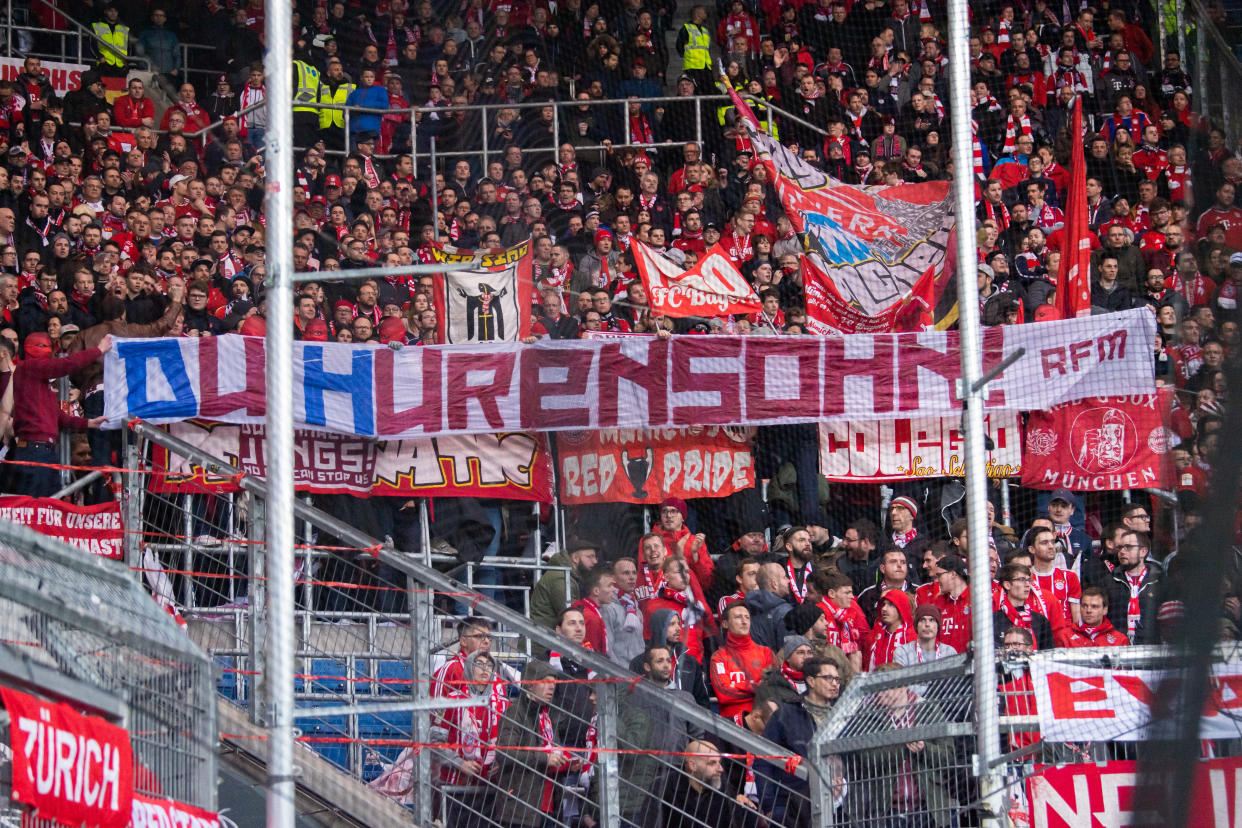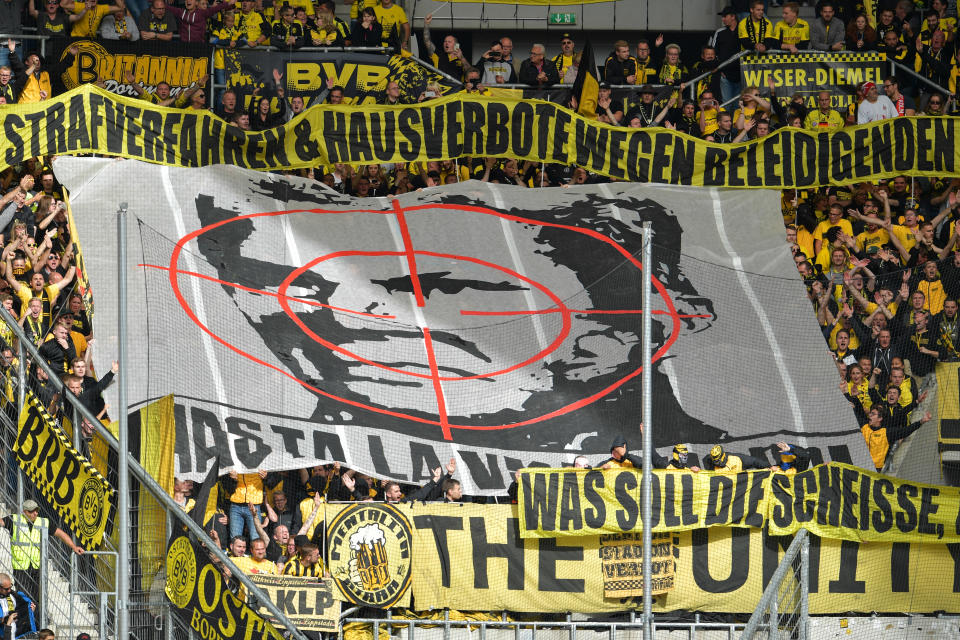By targeting Dietmar Hopp, Bayern Munich fans spotlight the 50+1 rule's defects — and their own hypocrisy

For the most part, people dislike billionaires. They have (quite literally) billions of reasons for doing so. And in the world of sports, it seems that no billionaire is attracting more ire right now than Dietmar Hopp.
Hoffenheim’s owner is the biggest story in the Bundesliga right now, as fans protest against him and the manner in which he has brought his hometown club to German soccer’s top table.
During Bayern Munich’s 6-0 win at Hoffenheim on Saturday, traveling ultras unfurled a banner calling Hopp a “Hurensohn,” or “son of a whore.” (The vulgar phrase, which is often heard chanted at Bundesliga games, is particularly offensive in the German language.)
When the fans refused to take the banner down after several warnings, the players were led off the pitch. This follows the underused protocol of UEFA’s three-step procedure for combatting racism, but the steps were taken on behalf of a rich caucasian 79-year-old, rather than a player being targeted for the color of his skin.
Bayern’s players and executives pleaded with the ultras — presumably as they feared their 6-0 win would be overturned to a 3-0 default loss if the game didn’t reach its conclusion — but when the players returned, they refused to actually play a game, instead opting for some aimless passing in protest.
Hopp has apparently earned the “Hurensohn” label for the manner in which he has flouted the traditional values of German soccer. The tech billionaire played for his local side Hoffenheim as a teenager, and proceeded to invest enough money in them to take them from the regional unprofessional lower league to Champions League qualification.
On the surface, it sounds like a rags-to-riches story of a man reinvesting in the local club he loves. But this isn’t the way things are done in Germany.
In a league where a “50+1” rule dictates that fan members must own a majority of shares in a club, Hopp is vilified for earning a special exemption from the rule that grants him permission for a majority stake.
He didn’t break the Bundesliga’s sacrosanct fan-owned rules, he benefited from a loophole that allows any party that has been significantly investing in a club for 20 years to gain a majority stake.
Hopp appears baffled as to why he is being singled out for abuse. “If I remotely knew what these idiots wanted from me, it would be all the easier for me to understand,” Hopp said.
But Bayern’s fans aren’t the only ones venting their anger at Hopp. And their protests aren’t necessarily aimed specifically at the septuagenarian billionaire.
In February, Borussia Dortmund fans were banned from attending Hoffenheim games for two seasons by the German soccer association (DFB) for displaying a banner with an image of the Hoffenheim owner in crosshairs during a 2018 match.

This ban goes against the DFB’s vow to scrap collective punishments for fans, as outlined in 2017. Bayern fans, therefore, were actually standing in solidarity with their Dortmund rivals over a perceived crackdown on their freedom.
Last weekend, Borussia Monchengladbach ultras also stood in solidarity by unfurling a banner with the same Hopp-crosshair imagery that got Dortmund in trouble. The Gladbach fans, however, were condemned for displaying such imagery in the wake of the terrorist attack in Hanau days earlier.
The “Hurensohn” banner has spread to many other clubs in Germany, including Union Berlin, whose tifo caused a game temporarily stopped on Sunday. Hopp, therefore, is the catalyst and unwitting motif for a greater protest that fans across the nation are aiming at the DFB.
It’s a complicated issue, and one in which the German authorities must be very careful with their response. Too little action could be read as carte blanche for abuse and hatred in the stands. But more punishment could lead to further revolt.
This is something of a watershed moment for German soccer. And while it does underline the fans’ commitment to standing up for their beliefs and rights, it also brings to light an element of hypocrisy within the protesting fans, and the potential shortcomings of the 50+1 rule.
Hopp may be an affront to German soccer values, but he is a businessman who has put money into his local club without breaking any rules. Unlike a club like RB Leipzig (who also draw ire for their formation and rapid rise), his financing does not directly represent the interests of a global brand. Renowned for donating significant sums to charities, schools and hospitals in the Heidelberg region, Hopp does not represent foreign investment. Hoffenheim are not guilty “sportswashing” for an Arab Emirate, or any such politically dubious antics.
To target Hopp for abuse seems odd, when he is merely investing back into his community within the confines of the rules. RB Leipzig and their controversial bending of the 50+1 rules (they only have a handful of voting “members,” most of whom are Red Bull employees) seem like a more reasonable target for fan abuse.
And when Bayern fans sneer at a rival’s investment, the optics point toward hypocrisy, given their own club’s financial operations. Bayern may be majority fan-owned, but Adidas, Audi and Allianz each own an 8.3% stake. All three impose their branding and corporate interests on the team.
At home games at the Allianz Arena, employees of Deutsche Telekom arrange themselves in the shape of the T-Mobile logo in the stands for TV branding purposes. Additionally, Bayern takes millions in sponsorship from Qatar’s state airline, which seems fairly antithetical to the ideals of German soccer fans.
In some respects, it feels like they are casting stones from their glass house when it comes to attacking Hopp.
Speaking up in favor of the fan-owned model also appears to have its shortcomings — mainly because the 50+1 rule isn’t applied evenly to every club.
Like Hoffenheim, Bayer Leverkusen are also granted an exception as they are a werkself (“factory team”) started by workers at the Bayer pharmaceutical company. Wolfsburg are immune to the statute too, as they are a werkself for Volkswagen. And RB Leipzig have circumvented fan ownership (or the spirit of it, at least) by only granting shares to people who happen to work for Red Bull.
Bayer have historically experienced issues with pesticides and pharmaceutical contamination, while Volkswagen caused an emissions scandal. Neither are completely upstanding, but both get a pass on 50+1.
Furthermore, the 50+1 rule aims to make things fairer for German clubs, but it arguably has the opposite effect.
If clubs are not permitted to receive a large amount of foreign investment, then the large, established clubs are effectively in a protected cabal. Bayern, with their riches and multinational corporate shareholder partners, are less likely to encounter a new domestic challenger. In this sense, their despair at Hoffenheim’s rise could be a reaction to the threat on their hegemony.
Additionally, the loopholes that provide exceptions to the 50+1 rules are dangerous in principle. If Qatar Airways provide consistent investment in Bayern for 20 years — as Hopp did in Hoffenheim — will they also be granted approval to take a majority share?
The protests against Hopp and the DFB are complex in nature, and fans are well within their rights to mount them.
However, it is important to note that the fan-owned model is far from perfect, and that those who fight for the sanctity of fussball could, on occasion, also benefit from some self-reflection.
More from Yahoo Sports:


